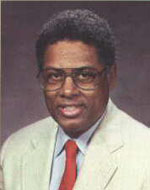Thomas Sowell
 Dangerous "safety"
Dangerous "safety"
"SAFTEY" HAS ONCE more turned out to be dangerous.
A sudden shortage of a vital pharmaceutical product made from blood plasma is threatening
the health of tens of thousands of Americans. Why? Because the Food and Drug
Administration stepped up its inspections of the companies producing this medical product
and these increased inspections have slowed down production.
The issue here is not who is to blame. There were legitimate concerns about possible
contamination of blood products by a rare disease. The reduced production caused by
screening for this contamination then put other people's health and lives at risk from other
diseases.
Whether or not the relative risks were weighed properly by all those involved in this case,
there is nothing unusual about one kind of safety creating greater risks in other ways.
An ingredient added to gasoline in California, in order to reduce air pollution and its health
risks, has now been found to create health risks of its own. It gets into the ground water
and has also been implicated in car fires.
One of the first of the great political crusades for "safety" was that against pesticides in
general and DDT in particular. The political success of this 1960s crusade was followed by
huge increases in the number of people infected with malaria and other insect-borne
diseases.
There is no question that pesticides create harm. So does oxygen, so does sunlight, so does
almost everything imaginable.
What all this means is that real safety is a matter of weighing one thing against another,
carefully and scientifically -- not launching an all-out crusade against one thing, in total
disregard of how this affects other things. Unfortunately, politics is not about such
subtleties.
In politics the goal must be a danger that will be ended, an evil that will be banished, an
enemy vanquished or a "problem" that is "solved." Finely weighed trade-offs do not give
you slogans that you can put on placards and bumper stickers or battle cries that you can
shout while people cheer.
Politics is a blunt instrument for dealing with safety issues. Unfortunately, that is not the
only problem. Safety issues are tailor-made for busybodies and for those who wish to
expand the power of government. That is because, no matter how safe anything is, it can
always be made safer -- at least in isolation.
Subway trains can always be made safer by setting lower speed limits and having fewer
cars per train, so that the brakes can stop the train in a shorter distance. Of course, that
will reduce the number of people the subway carries and cause more of them to use cars to
get to work. Since cars have more accidents than subways, this can lead to safer subways
while more people are injured or killed over all.
The dangers from asbestos in a building are so small that removing the asbestos can be
more dangerous than leaving it there, since more fibers are likely to get into the air when it
is being taken out of the walls. Some toxic waste sites are more dangerous when they are
being cleaned up, especially if the nearest residents are miles away, while the clean-up
workers have to be right in the middle of the wastes.
Another reason why real safety requires thinking in terms of incremental trade-offs instead
of categorical "solutions" is that wealth is one of the most important factors in safety.
A severe earthquake may kill a handful of people in California, while a similar earthquake
kills hundreds in a less affluent country and thousands in a poor country. That is because
homes, buildings and bridges in California can be built to expensive earthquake-resistant
standards.
If you are serious about safety -- as distinguished from being political about it -- then the
last thing you want to do is to hamper the production of wealth that saves lives. Nor do you
want to squander that wealth, which amounts to the same thing.
Politically, however, nothing is more of a grand gesture than saying that "not one human
life" is to be sacrificed for the sake of money. But squandering billions on safety measures
that accomplish little or nothing is squandering lives that would be saved if that wealth
were left alone.
We are not going to be rid of busybody crusaders or power-hungry politicians and
bureaucrats any time soon. What we can do is refuse to let them stampede us every time
they sound an alarm about safety. Beyond some point, "safety" crusades become dangerous.

5/1/98:
Abolish Adolescence!
4/30/98: The naked truth
4/22/98: Playing fair and square
4/19/98: Bad teachers"
4/15/98: "Clinton in Africa
"
4/13/98: "Bundling and unbundling
"
4/9/98: "Rising or falling Starr
"
4/6/98: "Was Clinton ‘vindicated'?
"
3/26/98: "Diasters -- natural and political"
3/24/98: "A pattern of behavior"
3/22/98: Innocent explanations
3/19/98: Kathleen Willey and Anita Hill
3/17/98: Search and destroy
3/12/98: Media Circus versus Justice
3/6/98: Vindication
3/3/98: Cheap Shot Time
2/26/98: The Wrong Filter
2/24/98: Trial by Media
2/20/98: Dancing Around the Realities
2/19/98: A "Do Something" War?
2/12/98: Julian Simon, combatant in a 200-year war
2/6/98: A rush to rhetoric

 Dangerous "safety"
Dangerous "safety"